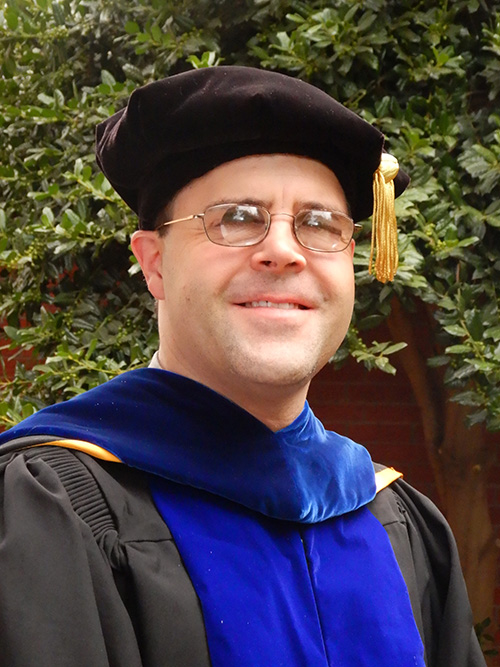Adam Schmidt
 What are your current research interests?
What are your current research interests?
My research program is integrative and multidisciplinary and exists at the nexus of developmental psychopathology, neuropsychology, and neuroscience. At the core, my research seeks to understand how child adversity shapes brain development and leads to the subsequent development of mental illness, learning difficulties, and cognitive and behavioral deficits. My lab accomplishes this by using a wide range of experimental techniques across different populations including preschool-aged children involved in Head Start, justice-involved adolescents, and young adults with histories of child adversity.
What types of outreach and engagement have you been involved with?
I am a pediatric neuropsychologist by training. I use this expertise to supervise clinical assessments in the on-campus psychology clinic as well as through a practicum for advanced graduate students at the Lubbock County Juvenile Justice Center (LCJJC). In this role, I helps students to gain experience with complex case presentations and provide a much needed service to the wider West Texas community; psychological assessments are difficult to obtain in the broader community more so for individuals with limited means. My research involves an examination of risk and protective factors in vulnerable youth including children participating in Head Start and adolescents in the juvenile justice system. As part of my research, I have worked with a local Head Start center to facilitate teacher classroom management and my lab has provided several parent trainings to help parents manage behavioral difficulties at home. Moreover, I recruit participants through LCJJC and work with LCJJC staff and administrators to ensure my research projects address critical areas of need for the local community (e.g., the risks and assets of youth in Lubbock County). In addition to these endeavors, I have been engaged in raising awareness of disability related issues to the broader professional community and to improving the training of clinical and counseling doctoral students through research and outreach.
Why did you choose this field?
I have always been curious about the workings of the human mind. I strongly considered pursuing a medical degree in psychiatry or a Ph.D. in neuroscience, but I determined that clinical psychology provided the best fit for my talents and the best combination of clinical and research work. I enjoy the mix of responsibilities from supervising clinical cases to helping students design research studies to writing grant proposals.
How do you define good teaching?
Good teaching is not reciting facts and figures to our students or the crusade to get students to think identically to the instructor. In fact, these are antithetical to what good teachers do. Good teaching is the act of telling a story that cannot be told through books and making connections that remain elusive. It is asking questions that may not have a clear answer or sometimes any answer at all. It is helping students think widely and approach information with an open but skeptical mind. It is aiding students to formulate opinions and perspectives and giving them the tools to cogently articulate and defend their beliefs. Good teaching is allowing students to ask their own questions and to pursue their own ideas. Finally, good teaching is possessing the wisdom and patience to sometimes let students make their own mistakes and displaying the compassion to reassure them that missteps are inevitable but also represent some of the most valuable learning opportunities life has to offer.
What is your proudest professional accomplishment?
My proudest accomplishments are whenever I facilitate a student achievement albeit graduating from undergrad, getting into graduate school, publishing a paper, or defending a dissertation.
How do you integrate research and outreach into teaching?
I strongly believe that the academy has a critical role to play in the vitality of our community and society as a whole. As a result, I strive always to tie my teaching to current topics and real-world problems. I believe that even the most complex theories or esoteric academic arguments have their roots in actual problems and controversies that effect society at large, and I always try to integrate these examples into my teaching. I am constantly drawing on recent research to illustrate key points, pointing out critical gaps in our knowledge that need to be addressed, and helping students understand how research can improve the care of our patients and inform policy. For example, when I supervise students seeing patients, I am always asking them to return to the literature to see, “what we know,” or, “what should be done.” This helps remind students that learning is truly a life-long endeavor and that academic research has a lot to contribute to more practical everyday issues. Students are often surprised by the degree of utility in, “Going back to the literature,” and before long do this independently when facing a complicated clinical task or informing their opinions about relevant professional and policy issues facing the field.
Please provide a brief bio, including your scholar background
Dr. Adam T. Schmidt obtained his undergraduate degree from The University of Texas at Austin and his doctoral degree in clinical psychology from the University of Minnesota. He completed postdoctoral fellowships in pediatric neuropsychology and rehabilitation psychology at Johns Hopkins University and Baylor College of Medicine. Prior to coming to Texas Tech University, he was faculty in the clinical psychology program at Sam Houston State University. His research focuses on understanding the role of child adversity in shaping brain development and impacting mental health within children and adolescents. He lives with his wife, Tiffany, son, Samuel, and Guide Dog Vente in Lubbock. He enjoys spending time outside with his family, reading history and Christian apologetics, and watching sports (especially college football).
Office of the Provost
-
Address
104 Administration Building, Box 42019, Lubbock, Texas 79409-2019 -
Phone
806.742.2184 -
Email
provost.communications@ttu.edu
